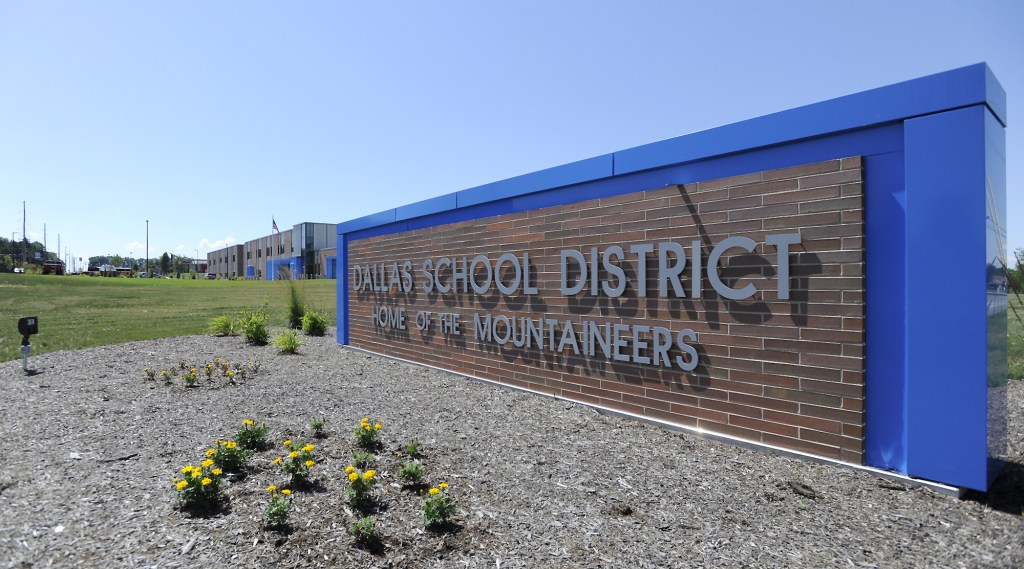DALLAS — Officials of the Dallas School District are laying out a recovery strategy after reviewing an annual audit that showed an increased deficit and rising costs.
The audit, which examined fiscal year 2024 (i.e. the period of time running from July 1, 2024 to June 30, 2024) and has been published on the district website, found the district’s general fund-balance fell $3.63 million, leaving the district with an unassigned general-fund deficit of $5.49 million, or 12.33% of its $44.57 million in budgeted expenditures in its 2024-25 budget.
Superintendent Thomas Duffy said at the school board meeting Monday that the district had worked to ensure the deficit did not affect the quality of education.
“Obviously, on the front side as it relates to our financial health, there’s zero impact being felt by our students, our faculty,” Duffy said.
These financial struggles have been attributed to several factors. The audit found that health care costs in fiscal year 2024 were significantly more than the school district had anticipated, owing in part to nationwide inflation in health care-related prices; and in part to multiple “catastrophic claims.” Duffy said health care costs came in at around $2 million over budget over the last two years.
The audit also flagged special-education costs, which came in at $1.19 million over expectations; and regular instruction was $2.32 million more expensive than anticipated due to factors including unexpected retirements and tuition costs related to cyber schools. .
These finances have left some uneasy. Duffy said Monday that Moody’s recently downgraded the school district’s credit rating, which had been listed at A3 in the fiscal year 2024 audit, to Ba2, due to its concerns over the deficit. Moody’s describes Ba2 as a “not prime” rating that indicates obligations have “speculative elements and are subject to substantial credit risk.”
Other factors the audit identified that may impact the district are a moderate decrease in enrollment expected in the next several years, upcoming negotiations with the teachers’ union, the Dallas Education Association, for when its collective bargaining agreement ends Aug. 31; and with the Dallas Educational Support Personnel Association after its collective bargaining agreement expires after the end of the 2025-26 school year.
Bridging the deficit may require the district to rely on its local tax base. The school board raised property taxes 4.80% to $14.9883 per $1,000 of assessed valuation after a closely contested 5-4 vote. It was the district’s second consecutive tax hike, with the school board having raised taxes 4.90% ahead of the 2024-25 school year, meaning district residents have seen their tax bills increase 9.94% over the last two years.
The district paired this tax increase with the refinance of some bond debt, which delayed a payment due in October and left the money available for operational spending during the year.
“Both of these things allowed us to avoid impacting programs in 25-26,” Duffy said.
While implementing these measures, Dallas officials have said their financial challenges warrant additional aid from Harrisburg. Duffy said the commonwealth has given Dallas only “miniscule” increases in state funding every year, leaving the district struggling to keep pace with growing costs. And the state-budget stalemate, which has delayed the delivery of state funding to Dallas and all school districts across the commonwealth, has only created further strain.
“What’s happening is with no budget, there’s no funding and school districts are starting to feel the crunch,” said Dallas School Board member Susan Allen, who is the school board’s legislative representative.
While Dallas School Board member Patrick Musto said he was confident in Dallas’ ability to recover from its current deficit, it was unfair to local taxpayers for the commonwealth to continue imposing new state-mandated costs.
“(Everyone) of us on the board and every school district are expected to promote public school education,” Musto said. “How can you do that when you don’t have the money to provide the funding?”
The audit reviews longer-term strategies the district is deploying to try to rein in expenses. It says the district generally plans to continue leaving certain teaching vacancies unfilled following retirements and resignations, “minimizing the need for layoffs while aligning staffing with financial realities.” Duffy said the district has saved around $1 million over two years through staff and faculty attrition without, he said, eliminating programs for students.
With respect to special education, the district will work to expand its in-district programming to reduce expensive out-of-district placements. School officials also discussed further developing Dallas’ internal cyber-school program to encourage students to stay in district and reduce cyber-charter tuition costs.
To limit health care costs, Duffy said the district, which self insures, has changed its broker and is doing a “network-disruption analysis” to consider hiring a new third party administrator. The district will also seek additional aggregate stop-loss insurance, competitively marketed on an annual basis, to limit the district’s exposure to high claims; promote employee health; and perform a “detailed analysis of dependent coverage eligibility and employee plan utilization…to ensure accuracy and prevent unnecessary expenditure.”
The audit credited the district for this work to “aggressively implement cost efficiencies and revenue-generating strategies” and to “proactively address the audit’s concerns and chart a path toward financial stability.” Duffy noted that the school district is projecting a decrease in its deficit in its budget for the year down to $4.51 million.
“We’re in the middle of a three-year plan to get the fund balance back to a better spot and we’re making great gains,” Duffy said.

